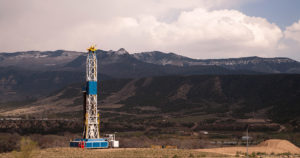Change to ASEA law would have enabled conflicts of interest in environmental monitoring of fossil fuel industry in Mexico
T his is the translation of a blog written by the Mexican Alliance Against Fracking (Alianza Mexicana contra el Fracking), a coalition of 40 local, state and national organizations in Mexico advocating for a ban on fracking. Food & Water Watch is part of this coalition.
his is the translation of a blog written by the Mexican Alliance Against Fracking (Alianza Mexicana contra el Fracking), a coalition of 40 local, state and national organizations in Mexico advocating for a ban on fracking. Food & Water Watch is part of this coalition.
Thanks to the work of organizations supported by citizens and some lawmakers, we managed to prevent a legislative proposal that would have possibly enabled dangerous conflicts of interest in the environmental monitoring authority of the fossil fuels sector in Mexico.
Two weeks before the end of the last legislative session, the Committee on Environment and Human Resources of the Chamber of Deputies passed an amendment to change the Law of the National Agency of Industrial Security and Environmental Protection in the fossil fuel sector (ASEA). The Mexican Alliance Against Fracking (Alianza Mexicana contra el Fracking) set out to assess this proposal, then reported on the significant risks it posed.
With the passage of energy reform in Mexico in 2013, ASEA was created to follow environmental issues specific to fossil fuel development. This has meant that instead of Mexico’s federal environmental agency (Semarnat) plus the environmental attorney’s office (Profepa) that have traditionally been in charge of all environmental issues, Mexico now has ASEA that oversees drafting regulations and permitting, monitoring, and sanctioning oil and gas companies. This agency has been bad news for communities and great news for the industry, because all permits have been fast tracked. This agency has shown significant deficiencies, including a clear distance to communities affected by contamination through fossil fuel operations.
Communities learn – and fight back
Through a social media campaign with the hashtag #AltoLeyASEA and successful advocacy on the legislative level, we managed to raise awareness of these conflicts of interest. A petition distributed by Avaaz reached almost 17,000 signatures in only two weeks. Rubén Albarrán, a singer with the group Café Tacvba recorded a video about the ASEA law change that received 22,000 views.
Over 200 national and international organizations sent a joint letter, asking for a thorough revision of the proposal involving civil society in the discussion. Despite these efforts, the Chamber of Deputies voted for the legislative change, with 264 votes in favor, 72 votes against and eight abstentions.
Successes in the Senate
We then moved our focus to the Chamber of Senators and invited citizens to call their representatives to vote against the law because it did not contain a mechanism to eliminate conflicts of interest between corporations and the agency that has to oversee them. Through this campaign, some Senators’ offices received dozens of calls.
On April 30, the legislative session in the Senate ended without putting the proposal to a vote. This is a small victory for all the people that followed the issue.
We know that we must keep scrutinizing legislative proposals and denouncing the harms to the environment and communities caused by the extraction of fossil fuels. We also know that academic studies show that there is no such thing as safe fracking – no matter which company fracks and which environmental regulation applies. This is why we need to keep up our intense work, day after day.
Thank you to all the people and decision makers who supported us to avoid dangerous changes of the ASEA Law!
In solidarity,
Alianza Mexicana contra el Fracking


